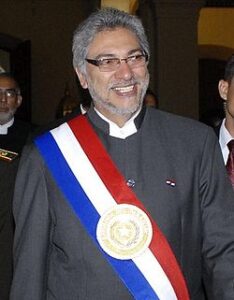San Pedro de Paraná (Paraguai), 1951
By Equipe Latinoamericana
Fernando Armindo Lugo Méndez, emeritus bishop, former president of Paraguay, elected in 2008 and removed from office in 2012 due to a controversial impeachment process.
Ordained as a Catholic priest in 1977 and appointed by Pope John Paul II as bishop of the Diocese of San Pedro in 1994 – an extremely poor region in Paraguay – Lugo entered politics in 2006 when he led a march of 40,000 people against the re-election of President Nicanor Duarte of the Colorado Party, a party that had been in power for more than 60 years at the time.
A proponent of Liberation Theology and leader of the Citizen Resistance movement, which gathered over a hundred associations and civil movements, Lugo fought against poverty and social injustice, particularly focusing on landless people. Known as “the bishop of the poor,” he renounced his ecclesiastical life to run for president in 2008, which resulted in a suspension a divinis (prohibition from celebrating Mass and administering sacraments) by Pope Benedict XVI.
Lugo promised to govern for the most disadvantaged populations, recognize the rights of the indigenous population, foster closer ties with Mercosur countries, and establish an agenda with Brazil to renegotiate the contracts for the sale of electricity from the Itaipu binational hydroelectric plant. Leading the Patriotic Party, which brought together political parties of various ideological orientations, he won the election with 40.83% of the vote, removing the long-dominant Colorado Party from power.
At the start of his administration, he enjoyed 90% approval from Paraguayans. Lugo implemented a progressive government: he increased the country’s share of the Itaipu Treaty revision; increased social investments; created a minimum income program for families in extreme poverty; universalized free hospital care; refused the establishment of a U.S. military base in the town of Mariscal; and denied subsidies to a Canadian multinational that sought to set up operations in the country.
Domestically, he faced staunch opposition, which held the majority in Congress. Among the opponents was his vice president, Fernando Franco, who broke with the government. Lugo chose moderation to negotiate with his opponents. However, when he blocked the approval of genetically modified organisms (GMOs), which had a powerful lobby in Congress, his adversaries began a process of dismantling his government. This ultimately led to Lugo’s ousting through a summary impeachment process led by Vice President Franco. Lugo held him responsible for a conflict between police and peasants during the eviction of a farm, which resulted in the deaths of sixteen people. Franco assumed the presidency temporarily but was not recognized by South American countries, which withdrew their ambassadors from Paraguay and suspended the country from Mercosur and Unasur in protest against what they considered a “parliamentary coup.”
In 2009, Lugo acknowledged the paternity of Guillermo Armindo Carrillo after a lawsuit filed by the boy’s mother and is also facing two other paternity lawsuits. He has been a senator for the Frente Guasú coalition since 2013, and his name was considered for a presidential bid in the 2018 elections.




